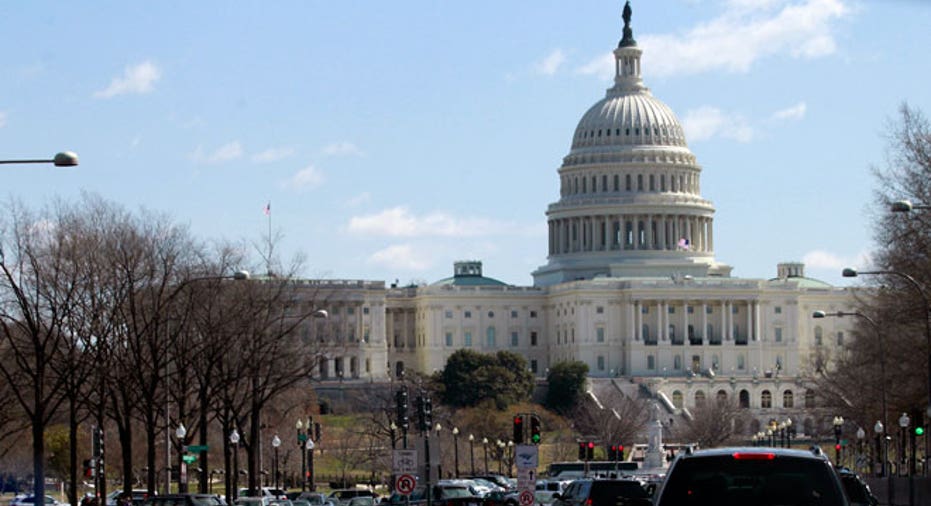The Deficit is Disappearing, Literally and Politically

One of the biggest political hot button issues of the past five years – the federal deficit – is expected to be mostly AWOL from the upcoming presidential election.
The reasons for this disappearing act are both practical and political. With regard to the former, it’s pretty simple: the deficit has shrunk in recent years.
As the economy has recovered from the nasty recession that followed the financial crisis, the deficit has declined by more than two-thirds, from $1.4 trillion in 2009 to $412 billion at the end of May, according to the Treasury Department. The most recent figure marks the lowest 12-month deficit since August 2008.
“It's not an issue because it's been in free fall,” said Greg Valliere, chief political strategist at Potomac Research Group. “Plus, interest rates are low. People need to see some consequences of the deficit, and they don't see any right now.”
The reality, as difficult as it may be for many Americans to stomach, is that a couple of deeply unpopular Congressional budget standoffs in 2013 and 2011 have actually been successful at cutting government spending and reducing the deficit.
The 2013 impasse shut down portions of the government for over two weeks and threatened an unprecedented default by the U.S. on its debts. A similar impasse in the summer of 2011 led ratings firm Standard & Poor’s to strip the U.S. of its gold-plated AAA credit rating.
Theatrical Battles Over the Deficit
In between there was the ‘fiscal cliff’ crisis of late 2012. That one forced the once-unthinkable across-the-board federal budget cuts known as sequestration, which, despite apocalyptic predictions, have proven particularly effective in cutting spending.
Political grandstanding at the time placed the ostensibly out-of-control budget deficit directly at the center of each these imbroglios.
In Congress, these annual fights slipped into a familiar pattern: weeks of partisan bickering and dueling press conferences preceded a doomsday deadline and last-minute resolution, all as a breathless media reported every twist and turn.
Yet, despite their unpopularity among average Americans, these theatrical battles ultimately proved effective in establishing a modicum of fiscal restraint.
Now, with the Republican presidential field wide open and a handful of Democrats mulling a challenge to front-runner Hillary Clinton, the economy remains a leading concern among voters but the deficit barely registers as an issue in the 2016 election.
Federal Debt vs. Deficit | InsideGov!function(d,s,id){var js,fjs=d.getElementsByTagName(s)[0],p=/^https:/.test(d.location)?'https':'http';if(!d.getElementById(id)){js=d.createElement(s);js.id=id;js.src=p+"://cdn1.findthebest.com/rx/widgets.js";fjs.parentNode.insertBefore(js,fjs);}}(document,"script","ftb-widgetjs");
Stan Collender, executive vice president at MSL Group, a Washington, D.C. based communications firm and a former staffer to both the House and Senate Budget Committees, said it was never really an issue in the first place.
“It’s an emotional issue for most people, not a substantive one,” he said.
To illustrate his point, Collender used an analogy often used by so-called ‘deficit hawks’ who argue American households have to balance their budgets. But, in fact, most American households carry a considerable amount of debt in the form of a mortgage, debt that benefits the family as long as there’s a job and an income to pay it down.
Witness Protection Program
In any case, politicians, according to Collender, often use the deficit as “subterfuge” to indirectly attack another target in pursuit of another agenda altogether, dismantling Obamacare, for example. “You can whip up emotions with it,” he said.
Collender said that as the deficit has declined the debate has been shifting to the national debt, which continues to climb and stood at $18.2 trillion this week, up from $10.6 trillion in January 2009.
For those who don’t know, the deficit is the annual difference between revenues taken in by the government in taxes and the amount the government spends, while the national debt is the total amount owed by the U.S. to its various creditors. Collender likened the deficit to the monthly balance on a credit card, while the national debt is analogous to the total amount owed on the card.
Surplus vs. Deficit | InsideGov!function(d,s,id){var js,fjs=d.getElementsByTagName(s)[0],p=/^https:/.test(d.location)?'https':'http';if(!d.getElementById(id)){js=d.createElement(s);js.id=id;js.src=p+"://cdn1.findthebest.com/rx/widgets.js";fjs.parentNode.insertBefore(js,fjs);}}(document,"script","ftb-widgetjs");
Politically, none of the erstwhile loudest voices that decried the deficit – the most conservative members of the GOP, tea party organizers and academic deficit cutting activists - currently stand to benefit from the issue, so they’re leaving it alone.
Given its importance to the far-right, the deeply fiscally conservative element of the Republican Party, Collender expects the issue to emerge during the GOP’s primaries ahead of the 2016 election. “It’s one of the big issues to people who vote in GOP primaries,” he said.
Besides that, the issue will likely remain in the “political equivalent of a witness protection program,” as Collender noted in a recent blog post.



















